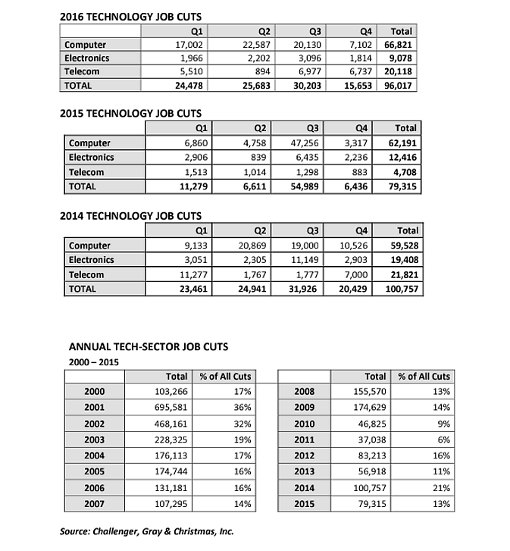Communications of the ACM
2016 Tech Cut Report: 66,821 Computer Jobs

Credit: Network World
After falling 21 percent in 2015, job cuts announced by employers in the U.S. technology sector increased by the same amount in 2016, according to a new analysis of layoff data by global outplacement firm Challenger, Gray & Christmas Inc.
Employers in the technology sector, which encompasses computer, electronic, and telecommunications firms, announced 96,017 planned job cuts in 2016. That was up 21 percent from a 2015 total of 79,315.
Computer firms announced 66,821 job cuts last year, 7 percent more than the 62,191 announced in 2015. The increase was due primarily to thousands of cuts announced by Dell Technologies in its $63 billion acquisition of EMC.
Telecommunications saw the most significant increase in job cuts. Downsizing in the industry surged 327 percent to 20,118 last year from 4,708 in 2015. This jump comes amid restructuring at telecom giants, such as Sprint, Frontier Communication, and Broadcom.
Overall, the tech sector was responsible for 18 percent of the 526,915 total job cuts announced in 2016.
"The increase in tech sector job cuts comes amid a time of growth and volatility. Traditionally stalwart companies have transformed to compete with start-ups that seemingly instantly become major players," says John A. Challenger, chief executive officer of global outplacement and executive coaching firm Challenger, Gray & Christmas.
"While the tech sector remains a strong area of growth, many of the strategies employed to compete ultimately end in some sort of job loss. Dell Technologies, in its acquisition of EMC, is maintaining its huge size to better help clients, while HP's strategy has been to downsize to remain nimble. Both entities cut thousands of jobs in the process.
"Thousands more are still to come, especially as companies shift focus to cloud-based computing and smartphones. Last year, we saw significant cuts from traditional equipment and hardware manufacturers," Challenger says.
Indeed, one of the larger tech-sector cuts in 2016 was the 12,000 Intel layoffs, 11 percent of its workforce, which resulted from the chipmaker's failure to take advantage of mobile technology. Meanwhile, Cisco Systems saw 5,500 jobs lost, 7 percent of its workforce, in order to compete with cloud computing giants like Amazon.
"It is likely this kind of job cutting will continue in 2017, as new technologies cause tech giants to shift and pivot," Challenger says. "The challenge for these companies, as it has always been, will be finding the skilled labor to keep up with the pace of change. The [U.S.] president's plan to reform access to work visas may significantly impact how tech companies recruit and retain talent."
In 2015, about 70 percent of the H1-B visas issued went to engineers, coders, and other tech workers from India. According to the Brookings Institute, 27,000 H1-B visa holders work in Silicon Valley.
"If any industry in the United States suddenly lost thousands of skilled laborers, it would have an immediate impact on operations and innovation. If this occurs in the tech sector, where innovation is the lifeblood of the industry, it could not only disrupt normal processes, but also significantly threaten the industry as a whole," Challenger says.

No entries found